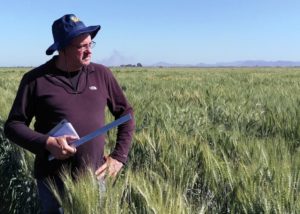
The international quest for better grain crops, and a young Flinders scientist’s public engagement, have received National Science Week accolades.
The efforts of plant biologist Associate Professor James Stangoulis and palaeontology PhD candidate Kailah Thorn were acknowledged in the Unsung Hero Awards of South Australian Science 2016.
Under the HarvestPlus program, Associate Professor Stangoulis has led the Flinders Plant Nutrition Group for the past nine years and helped to improve the nutrition of staple food crops such as wheat, rice and maize.
His work includes developing markers linked to food nutrition and has been received Australian Research Council funding for zinc marker development in wheat. Recent estimates indicate that 50% of the world’s soils are zinc deficient and 31 % of the global population suffers from a dietary zinc deficiency and most of these people depend on cereal grains and legumes as their primary dietary source of zinc.
The project aims to provide biochemical and molecular markers for breeding programs that will facilitate the selection of superior breeding lines for improved human nutrition and seed health.
Associate Professor Stangoulis has also developed new platforms for other plant scientists to use in improving plant biology research and researched mechanisms of adaptation and abiotic stress tolerance in plants.
HarvestPlus, which arose from the Consultative Group of International Agricultural Research (CGIAR), works with experts around the world on research related to biofortification, micronutrient deficiencies and the role of agriculture in improving human nutrition. It has been recognised through grants from various donors, including the Bill and Melinda Gates Foundation.
Associate Professor Stangoulis oversees all the micronutrient technical assistance, capacity building and plays a major role in the development of molecular markers for speeding up the release of staples with better nutrition.
The National Science Week Unsung Hero Awards also include one for outstanding contributions in the area of Science Communication. A finalist this year was Flinders PhD candidate Kailah Thorn, says she was thrilled to receive the award nomination.
“I’ve calculated that I have spoken to about 3500 school children in the past 12 months, including via the Flinders Palaeontology laboratory and University’s Student Access Unit,” she says.
Kailah completed Honours in Palaeontology at the University of WA, in partnership with the WA Museum, and has been at Flinders University for the past two years. She also has promoted science and learning at the SA Museum Discovery Centre.

